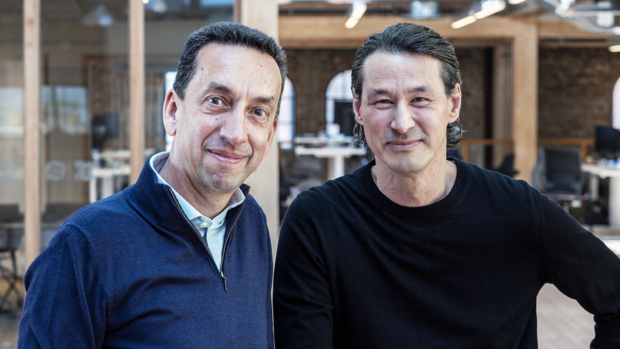Stockholm The Swedish oat milk producer Oatly gets a new boss. On June 1, Jean-Christophe Flatin will succeed Toni Petersson, who will become Deputy Chairman of the Supervisory Board after eleven years at the helm of the company. Flatin does not want a “fresh start”, as he said when he introduced the company, but wants to continue on the course of cost reductions that has already been initiated.
Challenges await the new boss in abundance on this course. Although Oatly, with its many oat milk products, has a market share of around 33 percent for milk substitutes in Germany and is thus clearly ahead of its competitor Alpro (23 percent), the Swedes are in the deep red. In the past year alone, the losses amounted to almost 400 million US dollars.
The market value of the vegan hype company has fallen to one billion euros since the IPO in 2021. With the IPO in New York, Oatly collected 1.4 billion dollars from investors at the time, the issue price of the shares was 17 dollars at the upper end of the price range. The company was valued at $10 billion at the time.
The share price is currently around $1.70. The new boss should now get the oat milk producer back on track. Flatin brings industry experience: Although he only joined Oatly a year ago as “Global President”, he previously spent 30 years in various positions at the confectionery and pet food group Mars. Most recently he was head of innovation there.
He can use the experience that Flatin gained at Mars and the animal feed subsidiary Royal Canin. Although Oatly increased sales by 12 percent to $722 million, margins are a far cry from the 25 to 29 percent target for the fourth quarter of this year. They are currently only 11 percent.
Oatly needs to cut costs before investor money runs out
Flatin and Petersson are optimistic that they can achieve this goal. After the end of the Covid-related closures of entire sales markets, especially in Asia, there is now an increase in demand for oat milk. In addition, prices could be raised in Europe, the Middle East and Africa.
The Swedish company positions itself hard against traditional dairy companies.
(Photo: Oatly)
Together with falling production costs per liter, the announced margin will be achieved, the two are confident. Analysts are also cautiously optimistic: ten out of 13 experts surveyed by Bloomberg recently gave a buy recommendation for Oatly shares.
This spring, Oatly secured $425 million from investors in a new round of funding. Flatin must now try to reduce costs quickly before the cash injection is used up again.
Oatly’s story began way back in 1994, when Swedish chemist Rikard Öste from Lund University discovered a way of using an enzyme to produce a milk-like liquid from oats.
Together with his brother Björn he founded the company Ceba Foods AB, which was renamed Oatly a few years later. The 74-year-old still holds a smaller stake in the company, which has long since attracted major investors.
oats stings
66
percent
Oat drinks have a market share in the milk alternatives business, followed by soybeans and almonds with just twelve to 13 percent each.
Oatly initially attracted attention with its brand work. The company attacked the traditional dairy companies with ironic advertisements. Three years ago, the image of the Swedes themselves was questioned. Under the leadership of Flatin’s predecessor Petersson, Oatly brought the controversial investor Blackstone on board. The investment giant has invested 400 million dollars in the Swedish company together with TV celebrities such as Oprah Winfrey, rapper Jay-Z and other US stars.
In particular, Blackstone’s participation of around seven percent led to a shitstorm on social networks. Classic Wall Street investors didn’t fit the Swedes’ anti-establishment image. One has sold one’s soul, wrote disappointed Oatly customers.
“Huge investments are required to achieve the climate targets and reduce greenhouse gases by 50 percent by 2030,” Oatly boss Petersson defended the decision in an interview with the Handelsblatt at the time. He was convinced that criticism of Blackstone’s involvement was unfair.
Oat milk market share is steadily increasing
“Blackstone shows everyone that the investments of the future are green.” He doesn’t have a bad conscience about that. Not because Blackstone is investing in coal power and deforestation at the same time. “Brown investments need to go green, and Blackstone has taken a first step in that direction.” The criticism has since died down.
>> Read also: Beyond Meat and Oatly? These three stocks offer greater opportunities
Oatly’s core product, oat milk, has prevailed on the market as a milk substitute over other raw materials such as soy, peas, almonds, cashew nuts or hemp. Milk substitutes made from oats had a market share of 66 percent in Germany last year, followed by soy and almonds with just 12 to 13 percent each.
Plant milk is already a billion dollar market, which is significantly larger than that for vegan meat. According to market researchers such as Euromonitor, vegan alternatives already have a share of almost ten percent in global retail. By 2025, the share is to increase to eleven percent.
By far the world’s largest supplier of plant-based milk products is Danone. In 2017, the French bought the US company White Wave, with brands such as Alpro and Provamel, which have been established for decades, for around 12.5 billion dollars. Back then, White Wave was already making $4.2 billion in sales – about six times as much as Oatly is today. And Danone wants to increase its plant-based products business from two to five billion euros by 2025.
Flatin has already taken the first steps to reduce costs at Oatly, including outsourcing production to other companies: In the USA, as Global President, he initiated the sale of a majority stake in a production facility in Texas to Ya Ya Foods.
More: Proteins from the fermentation tank – This is how start-ups want to replace cheese and meat.
